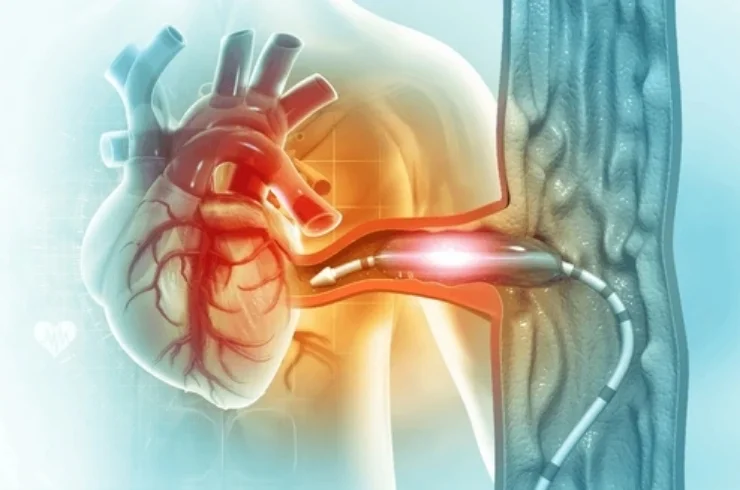Cardiomyopathy

Cardiomyopathy is a group of diseases that affect the heart muscle, making it harder for the heart to pump blood effectively. This condition can lead to heart failure, irregular heart rhythms (arrhythmias), or other complications if left untreated. Cardiomyopathy can occur due to inherited factors, other medical conditions, or lifestyle influences, and it affects people of all ages.
Types of Cardiomyopathy
Dilated Cardiomyopathy:
- The heart’s main pumping chamber (left ventricle) becomes enlarged and weakened.
- Commonly linked to genetics, viral infections, or alcohol abuse.
Hypertrophic Cardiomyopathy:
- The heart muscle becomes abnormally thick, reducing its ability to pump blood.
- Often inherited and may cause arrhythmias or sudden cardiac arrest.
Restrictive Cardiomyopathy:
- The heart muscle becomes rigid, limiting its ability to fill with blood.
- Usually caused by conditions like amyloidosis or sarcoidosis.
Arrhythmogenic Right Ventricular Cardiomyopathy (ARVC):
- A rare type where the heart muscle is replaced with scar or fat tissue, leading to arrhythmias.
- Typically genetic in origin.
Unclassified Cardiomyopathies:
- Includes rare forms that don’t fit into the above categories, such as Takotsubo (stress-induced) cardiomyopathy.
What Causes Cardiomyopathy?
The exact cause of cardiomyopathy is often unclear, but common contributing factors include:
- Genetics: Family history of the condition.
- Chronic Diseases: High blood pressure, diabetes, or thyroid disorders.
- Infections: Viral infections that inflame the heart muscle (myocarditis).
- Lifestyle Factors: Alcohol or drug abuse, and exposure to toxins.
- Autoimmune Conditions: Disorders like lupus that attack the heart.
- Nutritional Deficiencies: Lack of essential vitamins or minerals like thiamine.
Symptoms of Cardiomyopathy
The symptoms vary depending on the type and severity of the condition. Common signs include:
- Shortness of breath, even during rest or mild activity.
- Fatigue and weakness.
- Swelling (Edema) in the legs, ankles, feet, or abdomen.
- Irregular heartbeats or palpitations.
- Chest pain or discomfort, especially during physical activity.
- Dizziness or fainting spells.
If you notice these symptoms, consult a cardiologist immediately for evaluation.
How is Cardiomyopathy Diagnosed?
Diagnosing cardiomyopathy involves a combination of medical history, physical examination, and advanced tests such as:
- Electrocardiogram (ECG): Detects abnormal heart rhythms.
- 2D Echo: Visualizes the heart’s structure and function.
- Chest X-Ray: Identifies enlargement of the heart.
- Cardiac MRI: Provides detailed images of the heart muscle.
- Stress Test (TMT): Evaluates how your heart responds to physical exertion.
- Genetic Testing: Useful in cases of inherited cardiomyopathy.
Treatment Options for Cardiomyopathy
The treatment for cardiomyopathy focuses on managing symptoms, preventing complications, and improving heart function:
Lifestyle Changes:
- Maintain a heart-healthy diet.
- Exercise regularly but avoid overexertion.
- Quit smoking and limit alcohol intake.
Medications:
- Beta-Blockers and ACE Inhibitors to reduce heart strain.
- Diuretics to manage fluid buildup.
- Anti-arrhythmic drugs to regulate heart rhythms.
Medical Procedures and Devices:
- Pacemakers or ICDs: Help regulate or restart heartbeats.
- Septal Myectomy: Surgical removal of thickened heart tissue in hypertrophic cardiomyopathy.
- Heart Transplant: In severe cases where other treatments fail.
Why Choose Kurnool Cardiac Center for Cardiomyopathy Care?
At Kurnool Cardiac Center, we provide comprehensive care for cardiomyopathy, from early diagnosis to advanced treatment. Led by Dr. Nagendra Prasad Thota, an experienced interventional cardiologist, our team uses state-of-the-art technology to tailor treatment plans to your unique needs.
Whether you need medication management, non-invasive diagnostics, or advanced interventions, our goal is to improve your quality of life and protect your heart’s health.
Don’t ignore the signs. Book an appointment today and take the first step toward a healthier heart with Kurnool Cardiac Center.
Treatments
- ECG
- 2D Echo
- TMT (Treadmill Test)
- Angiogram
- Angioplasty
- Bypass Surgery
- Heart Failure
- Valvular Heart Diseas
- Arrhythmias
- Cardiomyopathy
- Congenital Heart Defects
- Lipid Disorders
- Coronary Artery Disease
- Coronary Angioplasty and Stenting
- Percutaneous Coronary Intervention
- Coronary Artery Bypass Grafting
- Mitral Valve Repair or Replacement
- Atrial Septal Defect Closure
Consult Kurnool’s Leading Heart Specialist
Reach out to Kurnool Cardiac Center and meet Dr. Nagendra Prasad Thota for advanced diagnostics and treatment.
